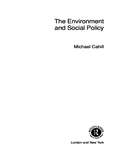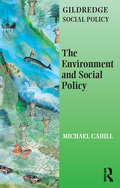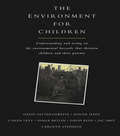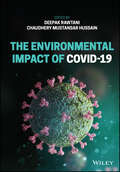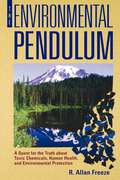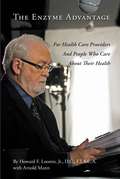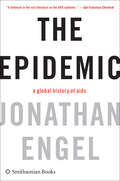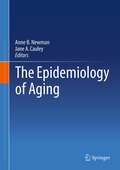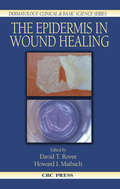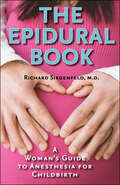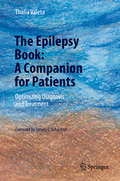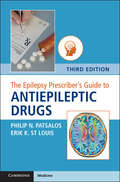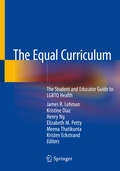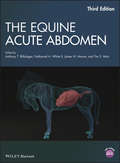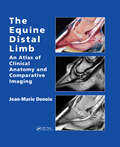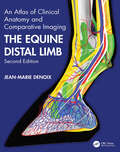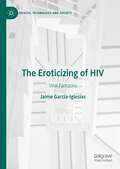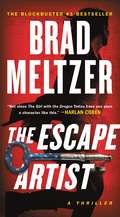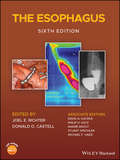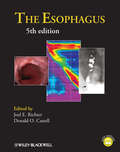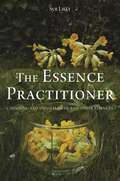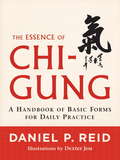- Table View
- List View
The Environment and Social Policy (The Gildredge Social Policy Series)
by Michael CahillFocusing on human welfare and the environment from a social policy perspective, this text shows how environmental concerns are becoming increasingly central to policy-making and discusses the roles of central and local government in relation to environmental issues.The Environment and Social Policy covers the following contemporary topics: sustainability, Local Agenda 21, green ideas, environmental health, housing and urban development, food, work and globalisation. Each chapter starts with an overview of the topic and ends with a list of key points and a guide to further reading. Core concepts are clearly explained and illustrated throughout this text which provides students with a concise and up-to-date summary of what they need to know.
The Environment and Social Policy (The Gildredge Social Policy Series)
by Michael CahillFocusing on human welfare and the environment from a social policy perspective, this text shows how environmental concerns are becoming increasingly central to policy-making and discusses the roles of central and local government in relation to environmental issues.The Environment and Social Policy covers the following contemporary topics: sustainability, Local Agenda 21, green ideas, environmental health, housing and urban development, food, work, globalisation. Each chapter starts with an overview of the topics and ends with a list of key points and a guide to further reading. Core concepts are clearly explained and illustrated throughout this text which provides students with a concise and up-to-date summary of what they need to know.
The Environment for Children: Understanding and Acting on the Environmental Hazards That Threaten Children and Their Parents
by David Satterthwaite et alEach year, millions of children die of environmental causes and many more suffer serious illness or injury. Children are often the most vulnerable to the condition of their environment -and their health is an index of its quality - but their wellbeing is rarely given priority by governments or aid agencies. Ironically, the problems can be traced back to matters which can be treated straightforwardly and at relatively low cost - poor drinking water or food, or infectious diseases which can be controlled. This book gives a multidisciplinary account of the environmental health hazards threatening children and the range of impacts they can have. It also explains what can be done, by communities as well as governments and aid workers, to provide safe and healthy environments for children. The book looks at conditions in a range of cities in the developing world, as well as pollutants and other health problems affecting children in the North. Published in association with UNICEF, and written by some of the same authors as Environmental Problems in Third World Cities (Earthscan, 1993), this provides excellent course material, and will be useful for practitioners working on child development, infant and maternal health, environmental health and community development. David Satterthwaite is Director of the Human Settlements Programme at the International Institute for Environment and Development, and principal author of Environmental Problems in Third World Cities (1993) and Squatter Citizen(1989).
The Environmental Impact of COVID-19
by Chaudhery Mustansar Hussain Deepak RawtaniTHE ENVIRONMENTAL IMPACT OF COVID-19 Discover the wider environmental effects of the COVID-19 pandemic with this up to date resource from leading voices in the field The Environmental Impact of COVID-19 delivers an insightful analysis of various environmental aspects of the COVID-19 pandemic that have caused global concern. The book discusses the transmission of COVID-19 in the environment, the pandemic’s environmental impact, risk mitigation and management, management of COVID-related waste, and the environmental implications of the virus. It also considers the socio-economic implications of COVID-19’s spread, including the effects of international lockdowns on different strata of society and various industries, including the biomedical industry, the environmental industry, and the pharmaceutical industry. An entire section of the text is devoted to a discussion about the waste generated due to COVID-19 and the effect of that waste on different environmental bodies. Another is dedicated to the impact of COVID-19 on the environment in the short- and long-term, including its effect on climate and climate change. Readers will also benefit from the inclusion of: A thorough introduction to the transmission of COVID-19 in the environment, including its viability in different environmental media and the effect of environmental factors in its transmission An evaluation and analysis of COVID-19, including traditional analytical techniques and sampling for COVID-19 and modern sensor-based techniques for identification An exploration of the socio-economic implications of COVID-19, including its effect on a variety of industries A treatment of the environmental impact of COVID-19 in the context of risk mitigation and management Perfect for academics and industry professionals whose work requires them to understand the wider environmental implications of the SARS-Cov-2 pandemic, The Environmental Impact of COVID-19 will also earn a place in the libraries of private sector professionals working on products and services that aim to reduce the environmental impact of the coronavirus.
The Environmental Pendulum: A Quest for the Truth about Toxic Chemicals, Human Health, and Environmental Protection
by R. Allan FreezeThe pendulum of environmental policy swings from one extreme to the other, depending on which camp is in power and who has the ear of the media. Underkill is followed by overkill. Concern breeds action; disillusion breeds reaction. The Environmental Pendulum provides a thoughtful and evenhanded assessment of this conflict. Tens of thousands of sites across the country are contaminated with toxic chemicals. Environmentalists warn us that this legacy of carelessness is seriously affecting both human health and the ecological balance of nature. They point out that even improved industrial practices will not eliminate future chemical releases to the environment. Their demand for regulatory control has received wide public support and led to the passage of the Superfund legislation in 1980. Now, after twenty years, the value of the Superfund program is being challenged by corporate America, which argues that excessive cleanup costs have the potential to bankrupt the nation. R. Allan Freeze outlines the difficulties associated with the management of hazardous waste and offers a balanced account of the controversy over the role of environmental contamination in human health. Freeze clarifies what matters and what doesn't with respect to chemical contaminants in the environment, arguing that environmental policies should be based on an accurate appraisal of the risks associated with these toxins. He concludes the book with a brilliant summation of the good news and the bad news of environmental pollution, describing what can and can't be done to bring the situation under control.
The Enzyme Advantage: For Health Care Providers And People Who Care About Their Health, First Edition
by Arnold Mann Howard F. LoomisThe book answers the question:'why we need enzyme'. The Enzyme Advantage is a resource book for all health care providers and people who care about their health.
The Epidemic: A Global History of Aids
by Jonathan EngelFrom the Castro bathhouses to AZT and the denial of AIDS in South Africa, this sweeping look at AIDS covers the epidemic from all angles and across the world. Engel seamlessly weaves together science, politics, and culture, writing with an even hand—noting the excesses of the more radical edges of the ACT UP movement as well as the conservative religious leaders who thought AIDS victims deserved what they got. The story of AIDS is one of the most compelling human dramas of our time, both in its profound tragedy and in the extraordinary scientific efforts impelled on its behalf. For gay Americans, it has been the story of the past generation, redefining the community and the community's sexuality. For the Third World, AIDS has created endless devastation, toppling economies, social structures, and whole villages and regions. And the worst may yet be to come: AIDS is expanding quickly into India, Russia, China, and elsewhere, while still raging insub-Saharan Africa.A distinguished medical historian, Engel lets his characters speak for themselves. Whether gay activists, government officials, public health professionals, scientists, or frightened parents of schoolchildren, they responded as best they could to tragic happenstance that emerged seemingly from nowhere. There is much drama here, and human weakness and heroism too. Writing with vivid immediacy, Engel allows us to relive the short but tumultuous history of a modern scourge.
The Epidemiology of Aging
by Anne Newman Jane A. CauleyThe average age of the world's population is increasing at an unprecedented rate and this increase is changing the world. This "Silver tsunami" emphasizes the need to provide advanced training in epidemiology and increase the cadre of experts in the study of aging. This book is designed to summarize unique methodological issues relevant to the study of aging, biomarkers of aging and the biology/physiology of aging and in-depth discussions of the etiology and epidemiology of common geriatric syndromes and diseases. Contributing authors in the book represent many disciplines, not only epidemiology and clinical geriatrics, but also demography, health services, research, cardiovascular disease, diabetes, psychiatry, neurology, social services, musculoskeletal diseases and cancer. The aim of the book is to provide a broad multidisciplinary background for any student/researcher interested in aging. The material in the book is organized and comprehensive. It represents the most up-to-date information on the scientific issues in aging research written by academics who specialize in research and training in the broad field of aging. The structure and organization of the book reflects our course series in the Epidemiology of Aging starting with the broad issues of demography and methodology, and then addressing specific health conditions and geriatric conditions common to older persons.
The Epidermis in Wound Healing
by Howard I. Maibach David T. RoveeNew biological techniques and a revival of interest in both acute and chronic wound healing have led to an enormously improved understanding of the cellular and chemical complexities of the healing process. Exciting developments in the evolution of epidermal biology are creating new opportunities for research and clinical applications in wound heal
The Epidural Book: A Woman's Guide to Anesthesia for Childbirth
by Richard SiegenfeldAddresses concerns, confusion, and misinformation about epidurals and other childbirth anesthesia.The majority of women giving birth in the United States receive an epidural during labor and delivery; many others receive a spinal block. The Epidural Book fully explains anesthesia used during labor and vaginal delivery or C-section, with an emphasis on epidurals. Dr. Richard Siegenfeld answers pregnant women's questions, including • Who administers epidurals and spinal blocks and when?• How does anesthesia affect both the mother and the baby?• Under what circumstances should a woman avoid an epidural?• What happens during the recovery period?• What problems can arise?Written by an experienced anesthesiologist, The Epidural Book is lighthearted and informative. This easy-to-read guide helps an expectant mother prepare for her all-important day.
The Epilepsy Book: A Companion for Patients
by Thalia ValetaThis book presents scientific evidence about epilepsy along with straightforward guidance and recommendations. Responses to frequently asked questions and clarification of uncertainties are provided to empower patients to optimize their medical, psychological and social care. This book helps mediate between patients and health care professionals and can assist both sides to understand the condition of epilepsy at all levels. The information provided in the book empowers patients to share decision making with their carers and clinicians and enables them to make informed decisions, by taking into account the best scientific evidence, as well as the patients' values and preferences. The Epilepsy Book: A Companion for Patients is ideal for patients with epilepsy and their carers, and will also be of interest to health care professionals, medical students and teachers. Thalia Valeta's approach to epilepsy facilitates deeper understanding of the unmet needs and expectations of patients.
The Epilepsy Prescriber's Guide to Antiepileptic Drugs
by Philip N. Patsalos Blaise F. D. BourgeoisPrescriber's Guide to Antiepileptic Drugs provides a practical and concise reference guide for use by all those clinicians and allied health professionals that treat or care for patients with epilepsy. In full colour throughout, this volume presents the antiepileptic drugs (AEDs) in alphabetical order and for each AED the information is divided into eight coloured sections: general therapeutics, pharmacokinetics, interaction profile, adverse effects, dosing and use, special populations, and suggested reading. This handy pocket guide will be an excellent companion for all clinicians that treat patients with epilepsy.
The Epilepsy Prescriber's Guide to Antiepileptic Drugs
by Philip N. Patsalos Blaise F.D. BourgeoisThis practical and concise book is an essential reference guide for use by all clinicians and allied health professionals that treat or care for patients with epilepsy. In full color throughout, this volume presents the antiepileptic drugs (AEDs), 34 in total, in alphabetical order and for each AED the information is divided into eight colored sections: general therapeutics, pharmacokinetics, interaction profile, adverse effects, dosing and use, special populations, overview, and suggested reading. This second edition has been extensively revised and updated. Specific additions include: • inclusion of the new drugs perampanel and retigabine (also called ezogabine) • updated pharmacokinetic interactions • suggested pediatric dosing schedules for several drugs • discussion about bone health, and vitamin D monitoring and supplementation • information on teratogenicity in the sections on pregnancy. This handy pocket book will be an excellent companion for all clinicians that treat patients with epilepsy.
The Epilepsy Prescriber's Guide to Antiepileptic Drugs
by Philip Patsalos Erik St LouisThis essential and concise clinical reference guide serves diverse clinicians and allied health professionals who prescribe antiepileptic drugs in contemporary clinical practice. Fully updated, it features chapters on newly-approved drug brivaracetam, updated paediatric prescribing, use in particular populations including women, elderly, and patients with cognitive impairment, as well as sections on teratogenicity, pregnancy, and lactation. In full colour throughout, the guide provides comprehensive antiepileptic drug (AED) prescribing information, covering all 35 AEDs in alphabetical order. Each chapter features eight coloured sections including general therapeutics, pharmacokinetics, interaction profile, adverse effects, dosing and use, special population considerations, a summary overview, and suggested reading. Perfect for quick reference use, the guide is practical and essential for all AED drug prescribers including adult and paediatric neurologists, neurosurgeons, psychiatrists, internists, geriatricians, paediatricians, family physicians, as well as allied health professionals and resident, fellow, and student trainees in all related medical fields.
The Equal Curriculum: The Student and Educator Guide to LGBTQ Health
by Kristen Eckstrand James R. Lehman Kristine Diaz Henry Ng Elizabeth M. Petty Meena ThatikuntaThis first-of-its-kind textbook marks a revolutionary effort to reform medical education nationally by providing a comprehensive, high-quality resource to serve as a foundation for lesbian, gay, bisexual, transgender, and queer (LGBTQ) health education across multiple disciplines. Addressing the decades-long unequal weight of medical education generally offered about the care of LGBTQ people, The Equal Curriculum was created to advance clinicians' competencies in optimizing the health of LGBTQ people. This textbook is designed to be integrated into health sciences curricula and offers pointed strategies to evaluate the integration of LGBTQ health topics. Starting with a brief overview, chapters 1 through 4 cover general content that is highly relevant to all health professionals working with LGBTQ people. Chapters 5 through 12 focus on specific patient populations and clinical specialties, and chapters 13 and 14 cover special topics. Key points in each chapter are highlighted to aid in the comprehension, and case vignettes are provided throughout the textbook, allowing learners to apply the content to clinical scenarios in order to evaluate how the application of relevant knowledge may impact health outcomes. Questions similar to National Board of Medical Examiners (NBME) style are provided in most chapters to assist in the application of content. As major addition to the clinical literature, The Equal Curriculum: Student and Educator Guide to LGBTQ Health should be of great interest to health sciences instructors, medical students in their preclinical and clinical phases, and trainees from other disciplines, such as physician assistants, nurses, social workers, and public health professionals.
The Equine Acute Abdomen
by James Moore Anthony T. Blikslager Nathaniel A. White Tim S. MairWritten and edited by leading experts on equine digestive diseases, The Equine Acute Abdomen, Third Editionis the preeminent text on diagnosing and treating acute abdominal diseases in horses, donkeys, and mules. The definitive guide to acute abdominal disorders in equine patients, fully updated and revised to reflect the latest developments in the field Lavishly illustrated with more than 450 color illustrations, photographs, line drawings, and figures A companion website features video clips and images from the book available for download Provides an invaluable resource to equine surgery and internal medicine specialists, researchers, practitioners, and students who deal with colic
The Equine Distal Limb: An Atlas of Clinical Anatomy and Comparative Imaging
by Jean-Marie DenoixJean-Marie Denoix is the world's leading equine musculoskeletal system anatomist and has become one of the foremost equine diagnostic ultrasonographers. There is therefore nobody better to compile a reference atlas of the clinical anatomy of the foot, pastern and fetlock, correlated with images obtained by radiography, diagnostic ultrasonography and magnetic resonance imaging. Advanced imaging techniques require in depth knowledge of anatomy for accurate interpretation and especially when using magnetic resonance imaging this must be a 3-dimensional concept of anatomy.
The Equine Distal Limb: An Atlas of Clinical Anatomy and Comparative Imaging
by Jean-Marie DenoixJean-Marie Denoix is the world’s leading equine musculoskesletal system anatomist and has become one of the foremost equine diagnostic ultrasonographers. There is therefore nobody better to compile a reference atlas of the clinical anatomy of the foot, pastern and fetlock, correlated with images obtained by radiography, diagnostic ultrasonography and magnetic resonance imaging. Advanced imaging techniques require in-depth knowledge of anatomy for accurate interpretation and, especially when using magnetic resonance imaging, this must be a three-dimensional concept of anatomy.This new edition replaces ultrasound images and most of the radiographic and MRI images with new, updated versions and adds brand new images of extraordinarily high quality. The multiple views of each area of the distal limb provide an extremely detailed evaluation, while every part opens with an anatomical drawing by the author. Each double-page spread deals with a single dissection viewed by means of colour photographs, labelled B&W equivalents, plus x-rays, ultrasound and MRI scans as required.Diagnosis and management of distal limb lameness require a precise knowledge of the functional anatomy and biomechanics of the equine distal joints, ligaments and tendons, presented in the last chapter. The atlas is designed for maximum clarity using a generous page size and is essential for anybody involved in detailed anatomical study, complex lameness evaluation or advanced imaging techniques.
The Eroticizing of HIV: Viral Fantasies (Health, Technology and Society)
by Jaime García-IglesiasThis book examines sexual fantasies and their influence on everyday life through the stories of twenty-two men who introduce themselves as bugchasers, i.e. gay men who eroticize HIV. The author defines bugchasing, charts its history and contexts, and considers how it has changed in the age of internet and PrEP. Through the participants, their experiences and contexts, this text also theorizes about sexual fantasies, seeking to understand how people define sexual fantasies and use the internet as a space to navigate their desires, meet others, and find support. Chapters also consider the practical implications of fantasy, most notably, how fantasies influence men’s decisions around HIV prevention and care. This book speaks to renewed interest in both the AIDS crisis and the sociology of everyday life to illustrate how fantasies such as bugchasing appear, evolve, and adapt. This book will be of interest to scholars focused on queer studies, sexuality studies, gender studies, and healthcare.
The Escape Artist: A Zig And Nola Novel (Zig and Nola #1)
by Brad Meltzer<P>WHO IS NOLA BROWN? <P>Nola is a mystery Nola is trouble. And Nola is supposed to be dead. Her body was found on a plane that mysteriously fell from the sky as it left a secret military base in the Alaskan wilderness. Her commanding officer verifies she's dead. The US government confirms it. But Jim "Zig" Zigarowski has just found out the truth: Nola is still alive. And on the run. <P>Zig works at Dover Air Force Base, helping put to rest the bodies of those who die on top-secret missions. Nola was a childhood friend of Zig's daughter and someone who once saved his daughter's life. So when Zig realizes Nola is still alive, he's determined to find her. Yet as Zig digs into Nola's past, he learns that trouble follows Nola everywhere she goes. <P>Nola is the U.S. Army's artist-in-residence-a painter and trained soldier who rushes into battle, making art from war's aftermath and sharing observations about today's wars that would otherwise go overlooked. On her last mission, Nola saw something nobody was supposed to see, earning her an enemy unlike any other, one who will do whatever it takes to keep Nola quiet. <P>Together, Nola and Zig will either reveal a sleight of hand being played at the highest levels of power or die trying to uncover the US Army's most mysterious secret-a centuries-old conspiracy that traces back through history to the greatest escape artist of all: Harry Houdini. <P><b> A New York Times Bestseller</b>
The Esophagus
by Michael F. Vaezi David A. Katzka Andre Smout Stuart Spechler Phillip O. KatzTHE ESOPHAGUS The Esophagus investigates the anatomy, physiology, and pathology of the esophagus. This sixth edition, revised and updated throughout, also explores the diagnosis and treatment of various esophageal conditions. It includes treatment guidelines approved by the two largest gastroenterology societies, the ACG and AGA, as befits a work co-edited by two former presidents of those organizations. Advancements in diagnostics are presented, as are developments in the surgical and drug therapies.Presented in full colour, and boasting an unrivalled team of editors and contributing authors, The Esophagus Sixth Edition will find a home wherever the anatomy, physiology, and pathology of the esophagus are studied and taught.This book is accompanied by a website containing all the figures from the book in PowerPoint format.www.wiley.com/go/richter/esophagus6ePraise for the Fifth Edition:“There is absolutely no doubt that this edition of the textbook will maintain its status as the go-to reference for esophageal conditions, and will remain a highly utilized and clinically useful resource for novice and experienced physicians and surgeons alike.” (Gastroenterology, 1 July 2013)
The Esophagus
by Joel E. Richter Donald O. CastellThis is easily the most focused and comprehensive book available dedicated to the esophagus and its conditions, fully exploring anatomy, physiology, pathology, diagnosis, and treatment. Edited by two former presidents of the ACG and ASG, the world's two largest gastroenterology societies, the text offers approved treatment guidelines from these organizations. This new edition updates all chapters with the latest developments, highlighting advances in diagnostic techniques, and both surgical and drug treatment therapies for esophageal conditions. The new edition also features an electronic component, with searchable text and all figures available in slide format.
The Essence Practitioner: Choosing and using flower and other essences
by Tony Pinkus Sue LillyThis practical handbook covers everything you need to know to use flower and other essences effectively with clients. Sue Lilly explains what is happening energetically when essences are at work and draws on her wealth of essence knowledge to provide guidelines on: · Assessing - techniques for testing clients · Choosing - how to select appropriate essences for a range of conditions · Using - new and innovative applications of essences · Creating - different methods of creating essences and guidelines for selling them · Expanding knowledge - how essences can be linked to chakras, meridians and subtle bodies and how this knowledge can enhance practice This comprehensive guide is ideal for any student starting out or any practitioner wanting to explore new ways of using essences.
The Essence of Analgesia and Analgesics
by Raymond S. Sinatra Jonathan S. Jahr J. Michael Watkins-PitchfordThe Essence of Analgesia and Analgesics is an invaluable practical resource for clinicians giving pain relief in any clinical setting, describing the pharmacologic principles and clinical use of all available pain medications. As well as detailed overviews of pain processing and analgesic theory, sections are dedicated to oral and panteral opioid analgesics, neuraxial opioids, NSAIDs, local anesthetics, anticonvulsant type analgesics, NMDA antagonists, alpha adrenergic analgesics, antidepressant analgesics, muscle relaxants, adjuvant medications, and new and emerging analgesics. The concise format of the chapters allows for quick and easy reading and assimilation of information. Enhanced by summary tables and figures, each chapter provides an overview of a particular drug, covering chemical structure, mode of activity, indications, contraindications, common doses and uses, advantages and disadvantages, and drug related adverse events. Key references are also provided. Edited by leading experts in pain management, this is essential reading for any clinician involved in pain management.
The Essence of Chi-Gung: A Handbook of Basic Forms for Daily Practice
by Daniel P. ReidThe beneficial health effects of daily chi-gung practice have long been known in China, but in the West, chi-gung is becoming increasingly used for general well-being and to complement conventional medical treatment. The Essence of Chi-Gung is an easy-to-use workbook that teaches the fundamentals of chi-gung practice and provides a safe, basic daily regimen that can be adapted for people of all ages and physical abilities. The view in Chinese medicine is that good health is maintained by circulating and increasing chi, the vital life energy that we are all born with. In chi-gung practice, slow, rhythmic breathing is synchronized with body movements, in a way which is beneficial to both the nervous and immune systems and to overall health. This manual includes over fifty step-by-step illustrations of the warm-up exercises and movement forms.
